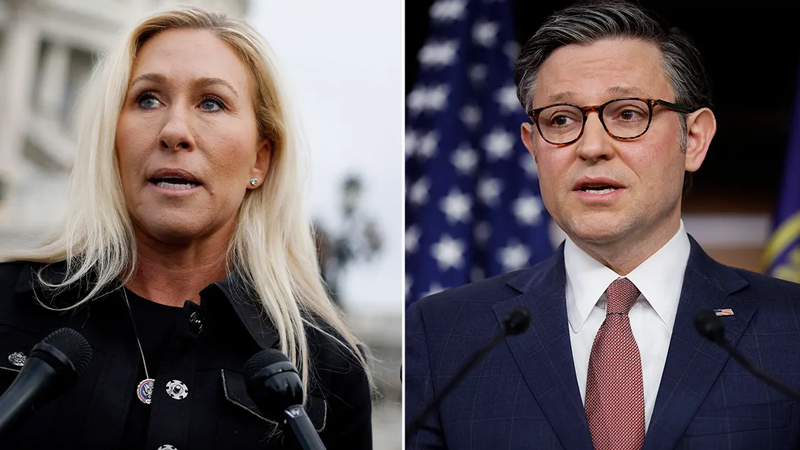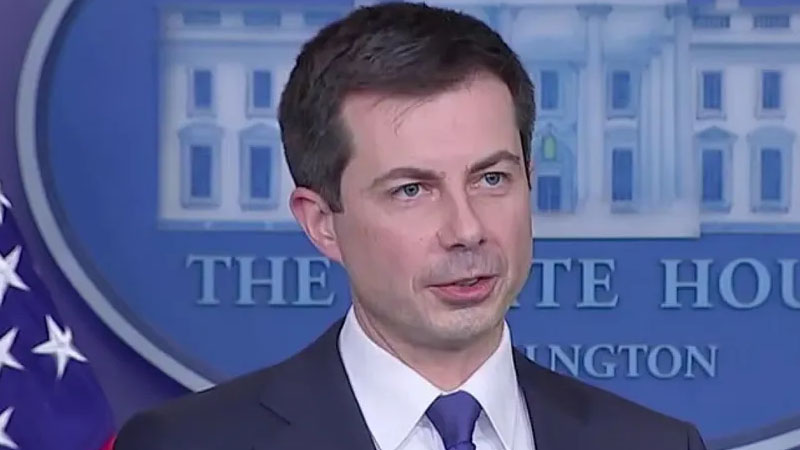Speaker Johnson Brushes Off Greene’s Threat as a Legislative Distraction

(Getty Images)
Speaker Johnson recently responded to the contentious remarks made by Representative Marjorie Taylor Greene, who has threatened to remove him from his leadership role, dismissing it as merely a “distraction” from the essential legislative tasks that require attention. This statement, as reported by DailyMail, comes at a time when political tensions are intensifying, underscoring the difficulty lawmakers face in staying focused on priority issues amidst internal party conflicts.
The friction between Speaker Johnson and Representative Greene, which has become increasingly public, stems from Greene’s pointed critique of Johnson’s leadership approach and her demands for his ousting from the speakership position. Greene, who is recognized for her bold statements and unwavering allegiance to former President Donald Trump, has been a divisive figure within the Republican Party, frequently in the spotlight for her combative political demeanor.
In addressing Greene’s challenge, Speaker Johnson voiced a broader concern shared by many in Congress over the necessity to prioritize legislative duties above intraparty disputes. With a long list of critical concerns, including the nation’s economic revival and healthcare overhaul, the pressure on legislators to produce concrete outcomes for the public is mounting.
During his address, Johnson called for unity and collaboration within the party, advocating for the setting aside of personal conflicts to focus on common objectives. He highlighted the significance of concentrating on forwarding crucial legislative initiatives, cautioning against allowing internal disagreements to detract from the overarching mission, Via ABC.
Despite the provocations from Greene, Speaker Johnson reiterated his dedication to leading with honor and determination. By characterizing the dispute as a minor distraction, he aimed to shift the spotlight back to the essential policy discussions that constitute the core of congressional duties.
The growing strains within the Republican Party mirror larger schisms in the American political scene, where ideological rifts often eclipse collective efforts to tackle urgent national issues. In an era marked by the aftermath of a global pandemic and economic instability, the demand for competent governance is acute.
The debate sparked by Greene’s attempt to displace Speaker Johnson highlights the fine line between political aspirations and the quest for communal advancement. Although political infighting is not novel, its disruptive impact can impair legislators’ capacity to effectively represent their constituents’ interests.
Amidst increasing disunity, there are louder appeals for more bipartisan cooperation and compromise. There’s a shared understanding across the political spectrum of the necessity to overcome partisan barriers in favor of pragmatic solutions that confront the complex challenges the country faces.
As Speaker Johnson steers through the choppy waters of internal dissent, his leadership acumen is put to the test. By stressing unity and steadfastness, he aims to lead a path that places collective welfare above personal political gains.
In the foreseeable future, the political climate is expected to remain volatile as legislators juggle conflicting interests and varying agendas. Yet, within this disorder, lies the potential for consensus and cooperative governance.
The destiny of Speaker Johnson and the broader direction of the Republican Party will depend on their capability to transcend internal disagreements and achieve significant progress for the populace. As the nation turns to its leaders for direction and stability, the call for effective governance is unmistakably clear.


